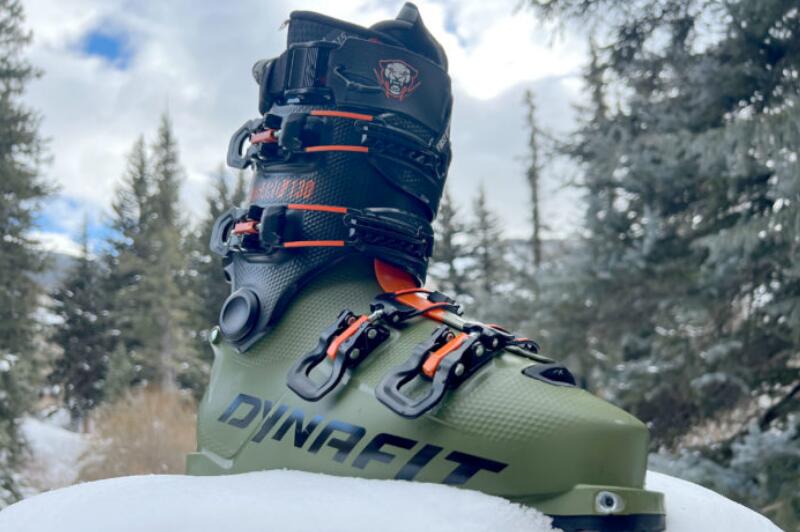Did you know Dynafit has a long history of downhill-oriented alpine ski boots? If you weren’t paying attention (or alive) back in the 1970s and ’80s, you’d be forgiven for this oversight. But the brand fondly remembers racers like Franz Klammer standing on the Olympic podium after donning Dynafit downhill race boots in 1976 and 1980.
Dynafit pivoted hard in the 1980s with the invention of its Tourlite boots and bindings. This invention spurred the revolution of tech bindings, which dominate the backcountry and skimo worlds to this day. And for many skiers, the tech binding is synonymous with Dynafit.
Prepare to reset your baseline. Last week, Dynafit introduced the Tigard, an alpine-forward, 130-flex ski boot aimed squarely at the touring-curious resort skier. I had a chance to ski the Tigard at Vail on Thursday and came away impressed.
In short: The Dynafit Tigard ($900) is a roomy, stiff, powerful four-buckle ski boot with a power strap that should drive most downhill skis powerfully. It’s compatible with GripWalk and pintech bindings. With a 70-degree range of motion, 1,590 g (3.5 pounds) weight, and a slick Hoji Lock walk-to-ski mechanism, it will work well for backcountry and sidecountry touring.
Dynafit Tigard
Specs
- Design Overlap construction
- Ski-Walk mechanism Hoji Lock System
- Sole GripWalk sole
- Liner Dynafitter 15 Liner
- Material Grilamid
- Cuff rotation 70 degrees
- Last width 101 mm
- Sizes 25-31.5 Mondo (Tigard 130) / 23-31.5 Mondo (Tigard 110)
- Weight 1,590 g (26.5 Mondo)
Pros
- GripWalk sole with tech inserts
- 130 flex
- Excellent walk mode
- True hybrid alpine boot
Cons
- A little heavy for pure touring
Dynafit Tigard Ski Boot: First Impressions
I want to be upfront about the fact that I have limited time on this boot. I skied a demo model for one day at Vail. But these are my first impressions. If I or another of our testers get a chance to put in more time, we’ll update this review.
Putting the boot on my foot for the first time was an eye-opener. Built on a 101mm last, this boot is roomy. I usually wear a 26.5 and sometimes a 27. But for the Tigard, a size 26 was my correct size. For a performance fit, I could possibly even ski a 25.5, but I haven’t had the chance to try it on.
But beyond simple sizing, the boot is spacious. Other skiers also noted that it was easy to feel comfortable out of the box, and I agreed. This will be great on sales floors. But for those looking for performance, footbeds or shims might be important to take up extra space inside the boot.
The Dynafit-branded liner is quite nice. Some skiers dislike Dynafit liners but seemed to have a change of heart for the Tigard. I have a mid-volume foot and skied it without additional footbeds. My ankle felt well locked in, but I would consider adding footbeds if I had my own pair to take up a little volume.
After a few minutes indoors, I had no hotspots and felt like the boot would be great for a day on the slopes. I’d know for sure in no time at all. Morning would soon deliver a nice 4 inches of fresh snow for testing.

Dynafit Tigard: Downhill Performance
With boots clicked into a pair of Dynafit Free 97 skis, I wasn’t driving a huge ski. But conditions were fun and challenging, with frozen cut up snow under powder. That led to a lot of variability, some tricky skiing, and moderate to high speeds.
The Tigard gave me a very powerful boot to handle my skis. Power transfer was instant, with the 130 flex feeling progressive but non-forgiving. These boots seem suited to big, stiff freeskis. They are built to charge. As a 155-pound skier, I don’t think I tapped into their full potential, especially on a relatively light ski.
But with that in mind, it seems Dynafit has accomplished a big goal here. It wants this boot to be resort-first. Skiers should be able to hop on a pair of all-mountain skis with alpine bindings and feel right at home. While we didn’t test them in this method (yet), I suspect the performance in that arena will be equally solid.

Dynafit Tigard Review: Conclusion
Our group skied all over Vail mountain, from frontside groomers to soft and variable back bowls. Temps were in the low teens, but nobody reported cold feet at all. Everyone skied well, and the group ripped like the experts that composed it.
At the end of the day, we sat down and discussed among the group at a round table. The consensus? This is a heck of a capable downhill ski boot. It is very comfortable for walking, which makes apres or treks to parking lots a lot more pleasant. And it bodes well for touring performance, although I didn’t get a chance to test this myself.
Time will tell how consumers view Dynafit’s reentry into the alpine ski world. But if they give the Tigard ($900) a try, I think many will be happy that the brand has hopped back on the chairlift and into alpine-centric shops — even if the skin track remains its priority.





